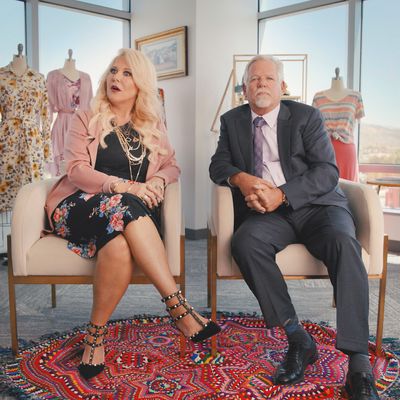
It’s nice to be able to recommend a four-episode docuseries about the implosion of a popular multilevel marketing scheme and feel confident that, for the viewers who already know they’re going to enjoy a four-part docuseries about an MLM, this one will hit the spot. LuLaRich, the new Amazon Prime series about the rise and partial collapse of the clothing company LuLaRoe, will be right up your alley if your alley is: docuseries about cults, docuseries about scams, true-crime docuseries, podcasts about any of those things, or sighing with resignation while scrolling past Facebook posts for LuLaRoe (or Herbalife, or Mary and Martha, or Mary Kay, or any of the other dozens of pyramid schemes of the past few decades).
LuLaRich benefits from running roughly chronologically. There are teasers at the beginning to let you know how bad things will be, and occasional jumps backward for additional context, but for the most part, the series’ four installments, which drop simultaneously tomorrow, generally chart the company from inception through its sharp rise in popularity, and then past the point when the cracks begin to show. This straightforward design is a welcome relief from the trend of so many shows (especially fiction, but docuseries as well) that leap through time willy-nilly.
It also lets LuLaRich showcase the oddity of LuLaRoe’s founders from the beginning. The company was built as a family project, the brainchild of DeAnne and Mark Stidham, after DeAnne had local success with an in-home fashion-resale business. The Stidhams, members of the Church of Latter-Day Saints, are the parents of 14 children, though the exact family math is tough to track as Diane rattles off a list of births and adoptions, spouses and grandchildren, and the offhand comment that two of the siblings are married to each other. (The Stidhams note those two are not biologically related.) This eye-opening personal detail is perfect for the start of a series about an eye-opening business catastrophe, and much of what unspools in the LuLaRoe story after this point is made more rich by the earlier deep dive into the Stidhams’ family and cultural values. It makes sense that the company struggles to stay ahead of its incredible growth, because the Stidhams largely hired underqualified family members to help run the business. The cultural appeal of LuLaRoe comes into focus, too, once it’s clear the Stidhams’ values helped sell the business to women looking for ways to financially support their families without having to work outside the home.
There are areas where LuLaRich excels. Several of its talking-head interviews are with women who had moving, upsetting, life-changing experiences with the company, and who can articulate that history in compelling ways. The series is also directed and edited with a gossipy sensibility and strong impulse toward the dishy, telling detail. (There is one offhand comment about Mario Lopez that eviscerates him in such an efficient, devastating way that I suspect I’ll remember the comment long after LuLaRich itself fades into the distance.) And there are areas where LuLaRich is less impressive — it lacks context about the LDS Church and the way Mormon fashion and modesty tie into LuLaRoe’s aesthetic, and although it gestures toward the end to the way LuLaRoe’s false feminism is really a trap door into misogyny, the series once again veers away from completing the circle between the company’s culture and the Stidhams’ religious values.
None of LuLaRich’s highlights or slips are spectacular or egregious. It is a perfectly well-made, perfectly adequate docuseries about American scam culture, and although it does illuminate the gruesome, life-destroying side of MLMs, what it mostly illuminates is how well this genre of docuseries has coalesced into its own system of tropes and devices. The first shot is of the Stidhams settling themselves into their interview chairs. Cameras are rolling, but the interview hasn’t officially begun yet, and we can see how pleasant and friendly they appear as they adjust their clothing and force their facial muscles to still. DeAnne pauses and insists on smoothing out a rug, even though the production team maintains the wrinkle isn’t in the shot. Look how meticulous she is, how focused on trivialities. See how clueless they are about how badly this is going to go for them, how blasé they are about all the lives they’ve ruined. It’s a shot that makes you realize how many times you’ve already seen it. The same is true for the cute graphics explaining how MLMs work, the second-nature documentary style of the talking-head interviews, and the social-media posts that flicker on the screen as rapid-fire evidence. The narrative curve is familiar too, from personal to sociocultural and then back to personal again.
LuLaRich is a well-told, entertaining, and infuriating series about the founding and explosive growth of LuLaRoe, and it hits the beats of a certain genre of documentary project with familiar, pleasant regularity. Its arcs are easy to anticipate, and its visual and directorial style is, too. There are no surprises, but it fits a mold in a way that makes the mold itself suddenly visible, and that’s satisfying in its own way.


